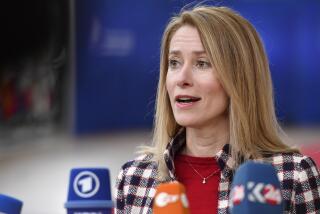EC Leaders Extol European Unity, Put Off Tough Issues
- Share via
BIRMINGHAM, England — European Community leaders, meeting Friday in an emergency session designed to restart their sputtering drive toward union, came away with little to show for their efforts but familiar appeals for more cooperation between national governments and less centralization of power at EC headquarters.
British Prime Minister John Major said the meeting would restore confidence in Europe at a time when chaos has swamped its currency markets, and public support for a common EC currency and joint foreign and defense policies has eroded.
“After the squalls of the past two weeks, it was necessary for us to meet and reset our course, to review what we are about,” Major said.
However, the 12 EC leaders finessed or postponed the toughest issues. In particular, they virtually ignored the tattered system of fixed exchange rates for EC currencies, even though it was strains in that system last month that led Major to call Friday’s meeting.
They also got no closer to securing ratification of the treaty on political and economic union that Danish voters rejected in June. That treaty, initialed by EC leaders in the Dutch town of Maastricht last December, would create a common EC currency by 1999 and establish mechanisms for setting joint EC foreign and defense policies.
Unlike most EC summits, this one barely addressed external issues. However, the 12 leaders called for stepped-up humanitarian assistance to war-torn Balkan nations, including winter shelter and safety zones for refugees.
But for the most part, they found themselves absorbed by the thorny internal issues that have increasingly divided them. High on this list was the recent turmoil in Europe’s currency markets, which last month drove the weak British pound and Italian lira out of the system of fixed exchange rates.
The leaders reiterated their conviction that the exchange rate system is “a key factor of economic stability and prosperity in Europe. . . . The recent financial turbulence calls for reflection and analysis.”
Even as the leaders met, the pound took another beating on the currency markets as Britain lowered its key short-term interest rate by another percentage point to 8% in an effort to halt a recession that is in its third year. The pound, which bought 2.8 German marks five weeks ago, fell Friday from about 2.465 marks to 2.44 marks. Against the dollar, it ended the day at $1.6545, down from $1.7045 late Thursday.
Major said the leaders did not discuss British interest rates.
As with their exchange rate system, the leaders once again endorsed the Maastricht Treaty on economic and political union. The treaty is on the ropes--rejected in Denmark, barely approved by French voters last month and facing stiff opposition in the British Parliament--in large measure because Europeans are growing increasingly worried that it will rob them of their national identities.
The leaders vowed to “respect the history, culture and traditions of individual nations” and said they would open EC institutions to greater public scrutiny.
More to Read
Sign up for Essential California
The most important California stories and recommendations in your inbox every morning.
You may occasionally receive promotional content from the Los Angeles Times.













